Betsy Lay with Lady Justice Brewing
Dolores Huerta, Marsha P. Johnson, and Ruth Bader Ginsburg mural at the Lady Justice Brewing Company taproom in Aurora, CO. Mural by LewinskiArt. Making the world better, one fantastic beer at a time. That is the ethos behind our latest brewery spotlight. We’re heading over to Aurora, CO, to one of the few all female …
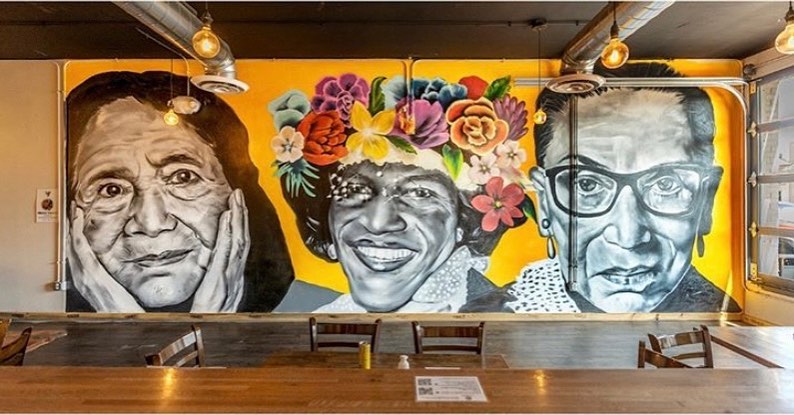
Dolores Huerta, Marsha P. Johnson, and Ruth Bader Ginsburg mural at the Lady Justice Brewing Company taproom in Aurora, CO. Mural by LewinskiArt.
Making the world better, one fantastic beer at a time. That is the ethos behind our latest brewery spotlight.
We’re heading over to Aurora, CO, to one of the few all female run, queer and latina owned breweries in our country: Lady Justice Brewing. While volunteering in service with AmeriCorps, the ladies of Lady Justice, Betsy, Kate, and Jen, crafted a new adventure with a brewery that would help serve their community. Their mission, to support and empower their community, happens through donations and partnerships with groups who are working endlessly for social justice. Among their philanthropic recipients is Dream Culture USA, a program to enrich young people and their families, working to eliminate the cycle of miseducation and generational poverty.
At Lady Justice, you’ll come to intimately understand the power of social enterprise and how your patronage can help tackle social problems. In our interview with Betsy Lay you’ll learn the story of Lady J’s origin, their mission and values, and how great beer can inspire us to step up and do good for a better world.
Nancy: Tell us about your role and what you do at Lady Justice.
Betsy: I am co-founder, owner and now head brewer. We’ve got a really great team here at Lady Justice. Kate Power and Jen Cuesta are co-founders, they’re still involved as they can be but they are both full time lawyers. It’s really hard to run a taproom and be a full time lawyer so they come in and out when they have time. Primarily, I’m running the joint.
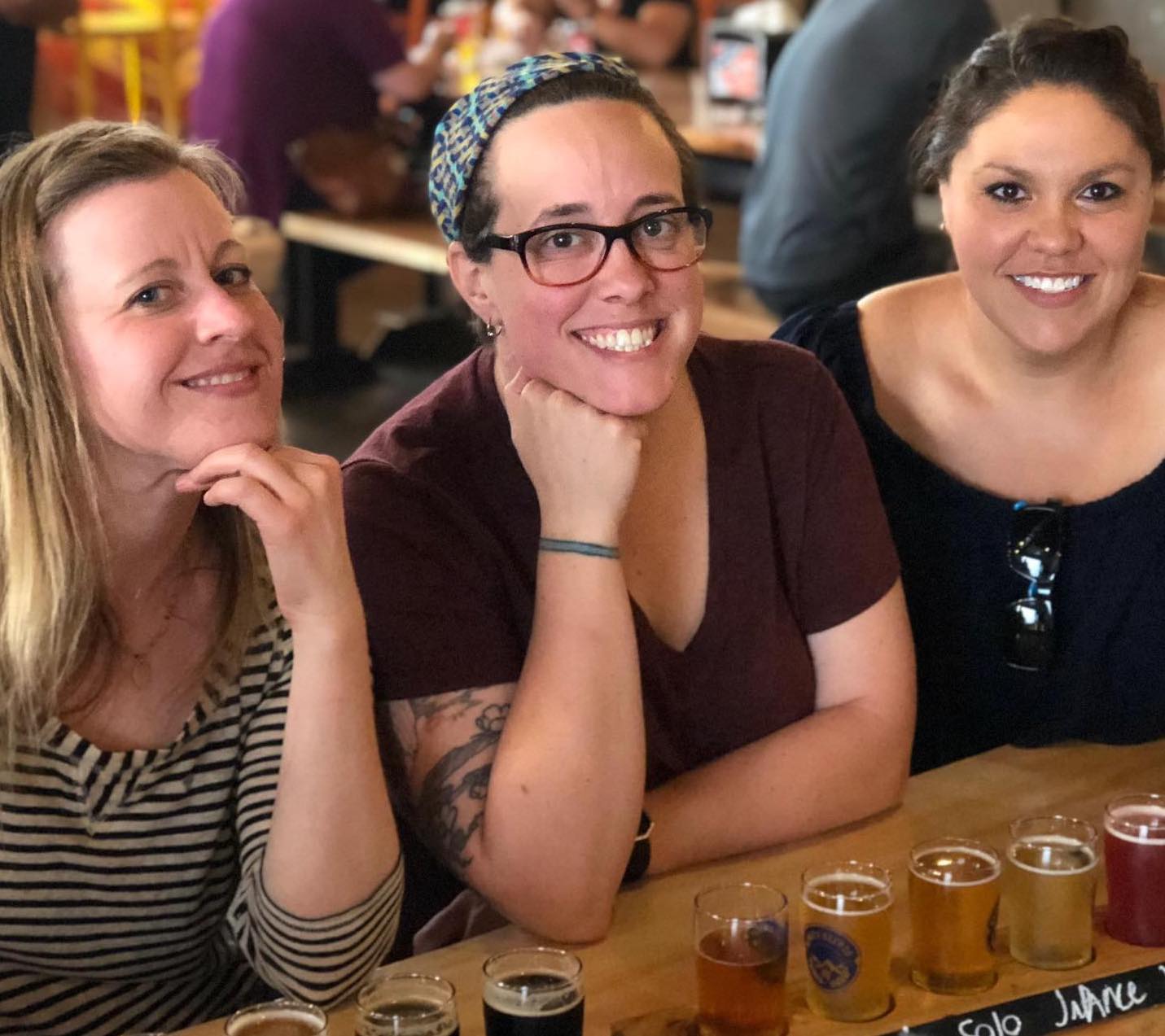
The Ladies of Lady Justice pictured from left to right: Kate Power, Betsy Lay, Jen Cuesta. Image courtesy of Lady Justice Brewing.
We sold our first beer in August 2016 but Lady Justice, as an idea, started to form when Kate, Jen and I were serving as AmeriCorps VISTA in Arvada doing capacity building with an education based nonprofit. It was hard because it was during the recession; there was no money and grants had pretty much dried up since regular funders had to stop funding. As an AmeriCorps VISTA (Volunteer in Service to America), you earn at the poverty level in the city that you serve—we were making $10,000 a year as VISTAs but we would still go to Vine Street after work to drink beer and talk about how much we didn’t like to fundraise during a recession. One day Jen said, “We’ve made it a priority to take the precious few dollars we have left over to go spend on beer and this place is packed all the time. I wish all our beer money could go help non-profits.”
Kate took that idea and ran with it.
We hit the ground running in 2014, opened very small scale with a 1 ½ barrel system. We did a membership model as our distribution because we didn’t have a taproom space. The idea was to get people to buy memberships ahead of time and they would pick up beer once a month. We started growing and growing until we opened this taproom in Aurora, CO in March, 2020.
Nancy: I want to dig into the mission part of what you do because I know that is core to your business. Talk to me about how you’ve incorporated the non-profit part of your business and what that looks like.
Betsy: When we first opened, our mission was 100% of profits over cost. We were able to accomplish that by starting off really small. Our beertenders are the only employees of Lady Justice, the rest of us still do this on a volunteer basis and work other full time jobs. Kate, Jen, and I started off small by offering community supported brewery memberships. People paid for the membership up front—that was all of the money we needed to operate for 6 months, and allowed us to control how much beer to make. After brewing costs and rent, everything else went right out the door to nonprofits.
At the time, we donated to nonprofits through granting systems. There was the youth grant for girls ages 11-17, giving girls the opportunity to advocate for themselves and talk about things they were passionate about. Then we had a 501(c)(3) grant application for organizations. That worked for us for about 2 years.
We grew and started brewing out of Factotum Brewhouse, which is when we changed up the granting model. We borrowed two of their tap lines and ran the taproom on Sundays—Sundays were Lady J days. Being in the taproom allowed us to showcase our nonprofits. We would choose 3 nonprofits every quarter to support through our memberships and invite those nonprofits into the taproom to have a big party. This way our members got to know the nonprofits better.
Now that we’re here in this [new] taproom we haven’t been able to hold events. So about every month we identify nonprofits in our area and give them money. We donated $6000 in 2020. Now, in 2021 we’ve re-launched our membership program and 100% of the profits for those sales will be donated to Colorado nonprofits. It should end up to be about $8,000.
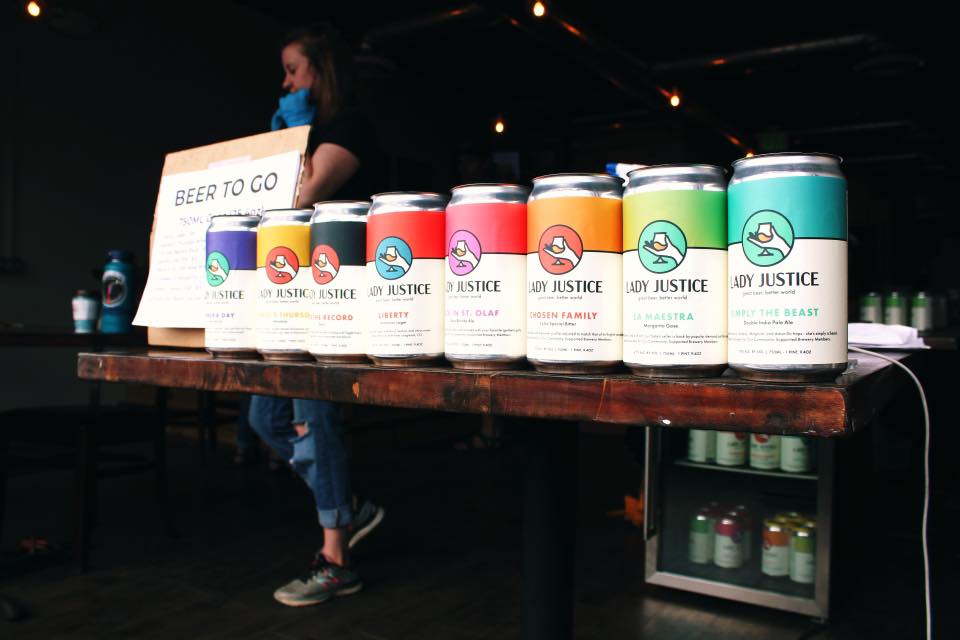
Image courtesy of Lady Justice Brewing.
Nancy: What are the parameters of the kinds of non-profits you work with?
Betsy: Whatever project we fund has to support and empower women or girls. It’s very general and that allows us to fund a variety of things. We’ve done everything from outdoor women’s wilderness projects to basketball camps and theatre troupes. One of our first grantees was a group that teaches single moms how to fix their car so that they’re never stuck at home where they can’t pick up groceries or their kids from school.
In 2020, we focused on giving to black-owned nonprofits, trying to show up in our neighborhood and be part of the community here in Aurora (Colorado). We’ve partnered a couple of times with Dream Culture USA which is a wonderful nonprofit that teaches boys and girls leadership skills and outdoor skills, among other things. They’re teaching kids how to balance a budget every month, what to do when they’re 18 and want to move out of their parent’s house, how to find an apartment, teaching them about credit checks—life skills that kids don’t necessarily learn in school or at home.
In 2021, our CSB Membership profits will go to Frontline Farming and the Girl Rising Program at Rangeview High School in Aurora, CO.
Nancy: Tell me about your journey into craft beer.
Betsy: I’m from St. Louis originally. I grew up in a world of Budweiser. It was a really great brewery when I was growing up and broke a lot of people’s hearts when they sold to InBev.
I moved to Denver in 2000 to go to the University of Denver. I was at a house party when someone handed me a beer… I think it was old school Breckenridge Brewery Honey Brown and I hated it. I was like, “what is this!? This isn’t beer!” (because I had only known Bud Light). That was the first opening I had into other types of beer in the world. Then I started paying more attention. In 2000 through 2004, Fat Tire was in every bar in Denver but nowhere else. Fat Tire was my gateway beer. Being in Denver at a time when, what are now giants, were still little—Great Divide, New Belgium, Odell, Avery—was really exciting because craft beer was starting to become part of that culture.
I moved back to St. Louis for a couple years then went to graduate school in Dallas and found myself really missing good beer. By the time I moved back to Denver to do AmeriCorps in 2009 I was pretty much hooked into craft beer and started home brewing. That’s how it began.
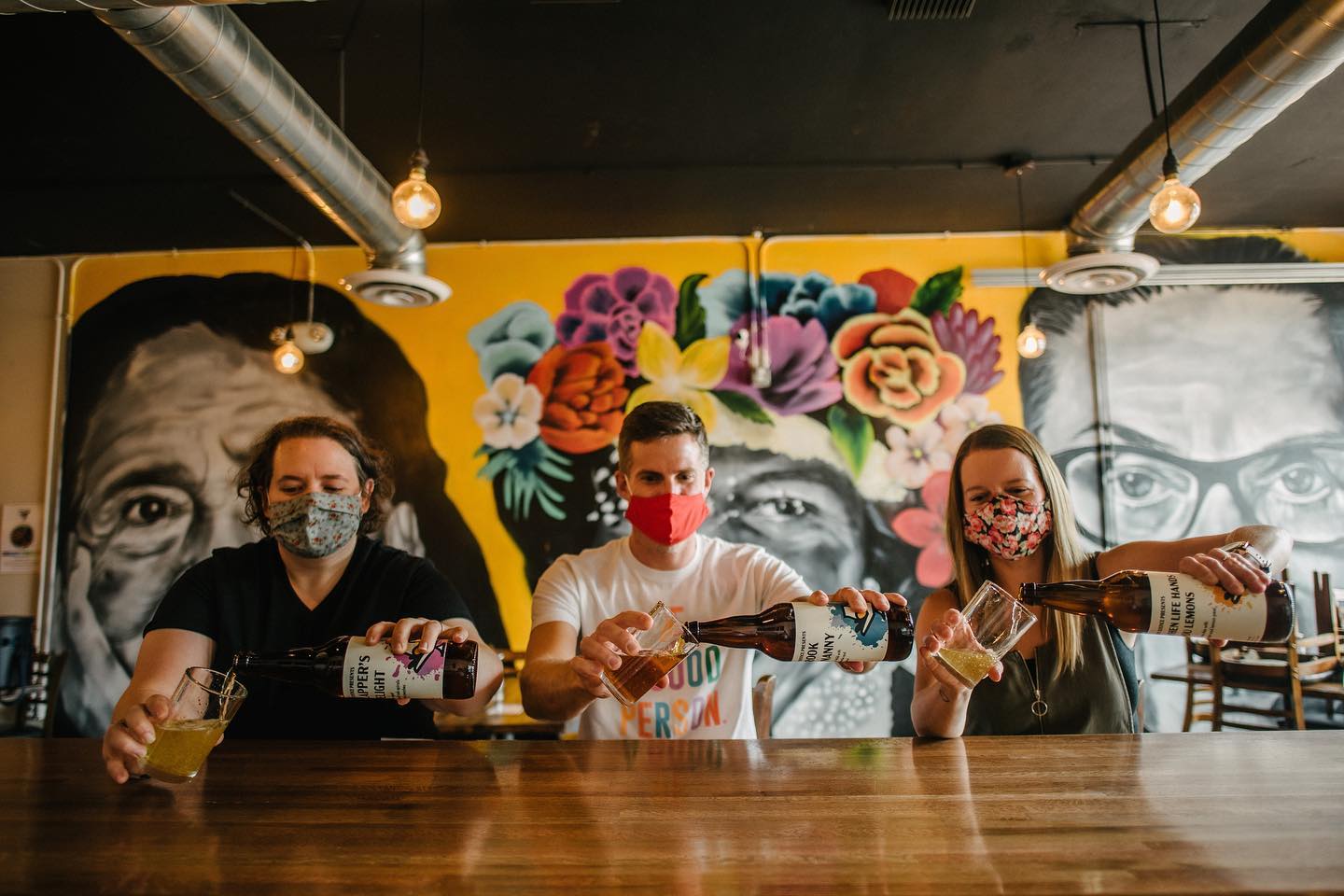
Photo by Friends & Lovers Photography.
Nancy: Usually at this point we dig into the taproom experience but we’re talking theoretical because of COVID. Can you talk about what the experience can and will be in your taproom once those doors are wide open?
Betsy: We’ve only operated under COVID restrictions in our space. But, what we had envisioned for this space, and what we have always envisioned for any brick and mortar, is to be a community space. We envision being a spot where community-based organizations in the area can highlight what they are doing, introduce our customers to them, and introduce their customers to Lady Justice. We want it to be a fun, bright, happy space for people to hang out. We always want to make sure we are an inclusive space, we want anyone who comes in here to feel like they belong—that’s really important to us. Part of inclusivity for us is making sure we help people find a beer they love even if they have never enjoyed a beer before. We pay attention to that and try to be very accessible with the beer we are brewing. Making sure this is a happy and meaningful experience for people.
Part of being a philanthropic brewery is trying to make sure people understand this topic of social enterprise and really grasping that as a consumer, our consumer dollars have a lot of power.
We can teach people that by spending money on beer here they’re helping improve their neighborhood. We want social enterprise to happen in more and more places, we want to be an inspiration for people to either open their own social enterprise or think about how they spend their money differently. Helping people realize and recognize while they are here their presence is helping make positive change in the world.
Nancy: Tell me about your team. What makes your team special?
Betsy: They’re amazing. We’re very lucky. Kate, Jen, and I have known each other for 12-13 years now. When we were in AmeriCorps, Kate, Jen and I were spending close to 90 hours a week together because we worked together and we hung out together. If one of us hadn’t been there, I don’t know that Lady Justice would’ve happened. It was really important that this was founded as a team. What we didn’t understand was that being three women doing this was going to be important and special because there aren’t that many female owned breweries in the world. We’re lucky there are 5 in Denver and those numbers are growing which is awesome.
We have two part time beertenders, Jenna and Richard. They are awesome, they’re amazing. They are the reason why I get to have a weekend. I had not had a weekend off in like 5 years before we brought on Jenna and Richard so they are like my all time favorite people.
When we opened in here, and actually when we moved in with Factotum in the summer of 2018, we brought on Aimee Soete as our head brewer. She was working with Renegade as their head brewer and director of operations when she had to get a brain tumor removed. Which made it difficult for her to brew on a large scale. She is a good friend of ours and we invited her to brew for Lady Justice to help her get back into brewing. She stuck around. Aimee was our very first employee and a really big and important part of our story. Just a couple weeks ago she had a relapse of cancer so she stepped down, that is why I am the head brewer again. She’ll still be a part of the Lady J family but she’s not able to focus on brewing right now. She is a really big and important part of our story—she helped us go from glorified homebrewers to brewing in a 7 barrel brewhouse. Even though she’s not technically our head brewer, she’ll always be a part of our Lady J family.
Then we have Laura Ralston who is our business operations person. She’s our numbers person and I am so grateful she is here. I enjoy numbers and I enjoy forecasting stuff but Laura is really that one who can sit down and say, “this is what we need to be charging for this beer and hey, Betsy, if you don’t scale back spending then we’re going to be closed in 6 months.” She’s really wonderful in helping us make sure we’re financially stable.
Then Alison Wisneski, my wife and our director of marketing. She manages our website, marketing and all of our social. That’s what she does in her full time job—she’s very good at it and we’re so lucky to have her on the team because having a professional doing your social media as a brewery is game changing. Breweries are small, they are agile and nimble, and social media is a really weird beast so to have someone who actually knows what they are doing is a huge part of why we are so successful in this space right now.
Oh and then we have Paul. Paul is so sweet. He grew up with Alison, they’ve known each other since they were in high school and he comes and volunteers on Wednesdays and hangs out with me in the taproom and does whatever needs to be done.
Everyone at Lady Justice has helped us make decisions and figure out what direction we’re going. I don’t like to make decisions in a vacuum; even though I’m technically the one in charge, it doesn’t feel that way. It feels very equitable and level in terms of voices that get heard. Everybody here plays an important role in our success.
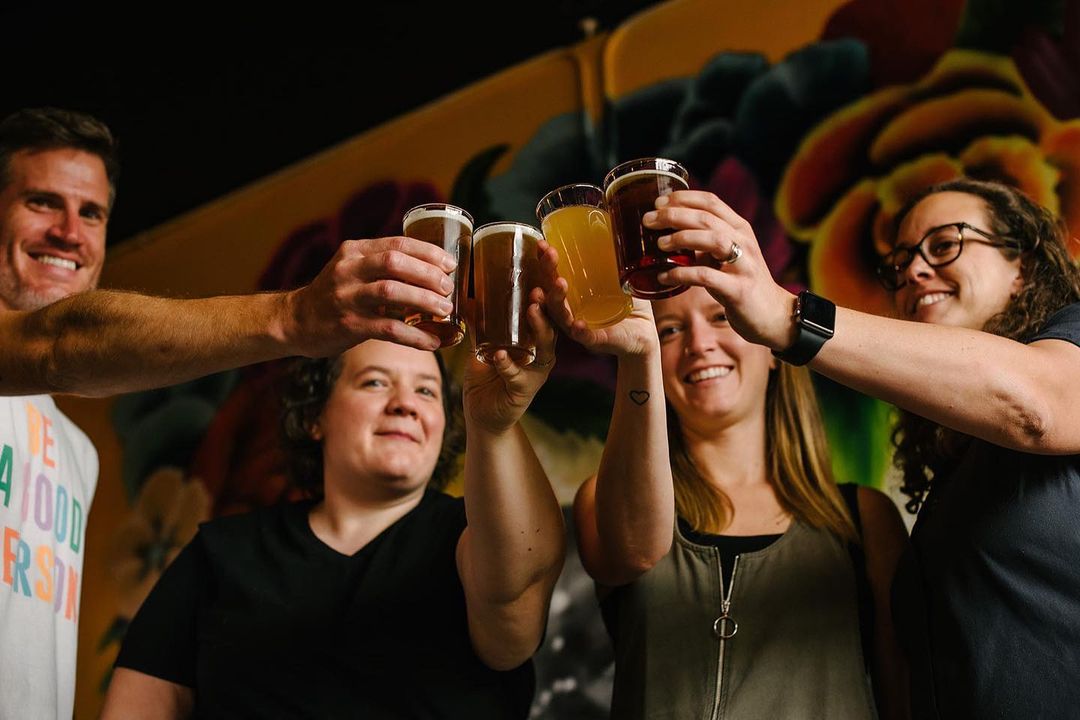
Photo by Friends & Lovers Photography.
Nancy: This past year has been a weird one, I’m looking forward to 2021 being a new year. Talk to me about what you have learned about yourselves and your business in this time.
Betsy: It’s really interesting the timing of everything. If COVID had hit one month earlier we might not have opened this taproom. We found this space and finalized the sale on March 1st. If COVID had hit Feb. 28th, I wouldn’t have done it and we would be on a hiatus, floating about doing contract brews and community partnerships. If COVID had hit 2 weeks later, we would have spent thousands of dollars on stuff we didn’t need. We had this very small window of being able to be successful in this space and we just happened to be in it when our lease went into effect. When we moved in here, we were able to move in here with COVID in mind and very few businesses were able to do that. We were very lucky.
We already had a to-go model, it was our membership model so we knew how to do that, only we had to learn how to do it on a slightly larger scale. We were learning about distribution: doing it quickly, well and safely. We had trust that the years of work we’d put in ahead of this were going to pay off and trust that our customer base, who has always been extremely loyal, were going to keep showing up. They’re still showing up still to this day. I think we’ll survive COVID
If all of 2021 is in some sort of COVID shut-down, that is what we’re planning for. What we learned is to trust the work we already put into this and roll with it. What I try not to do is make decisions solely on COVID. We had to start distribution in canning earlier than we thought but how do we make sure it’s sustainable, how do we make sure it’s successful after COVID. We’re learning how to be present for what is happening but doing it in a way that will help us succeed in the future. If there are any good things to take out of what is happening to us right now: roll with it, take some risks, and just be.
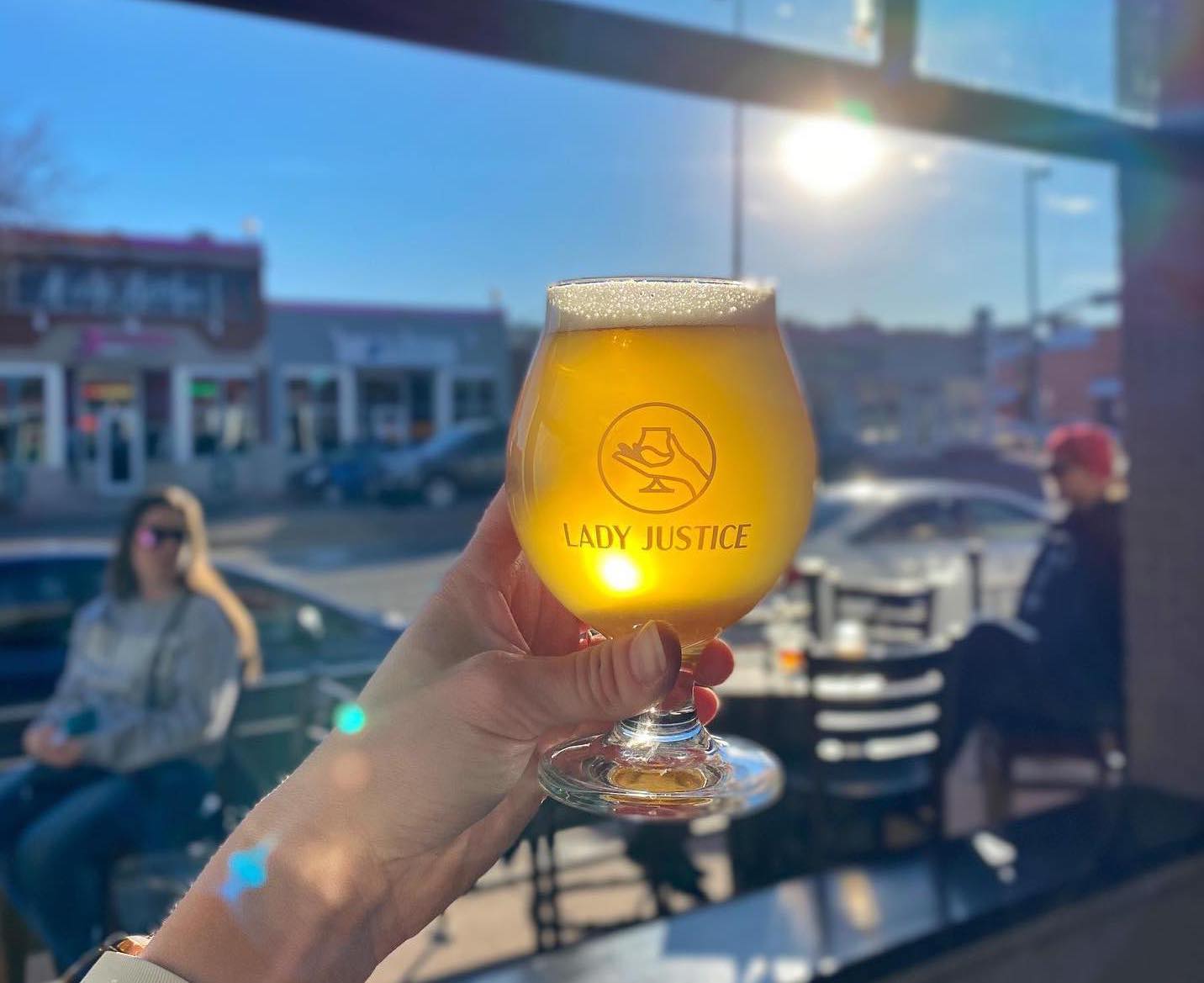
Image courtesy of Lady Justice Brewing.
Nancy: If you had more time and resources, what is something you would like to do? What is your oyster?
Betsy: That’s a really good question because there are a lot of oysters. A goal since day one was to be a successful model for other people to replicate. If we had time or resources, I would set up a hub to teach small business and people how to be a social enterprise, that way more people can function the way Lady Justice does.
The other fun thing, I would love to have a destination farm to table brewery. We love being here, don’t get me wrong, this space will be here for a long time and I LOVE being in this art district. But I think it would be fun to do a rural version of what we’re doing, to have more physical space to play with.
Nancy: Usually this is when I would ask people what advice they would give people who want to start a brewery but I’m going to give you a different platform: what is some advice you would give someone who was looking to make more of a social justice business?
Betsy: Part of what has made us successful and given us the ability to do more with less is our wonderful community relationships. We’re intentional with building good relationships with all our vendors and neighbors. Being able to foster community relationships with everyone from the barber who works at the shop next door, to community officials, to your vendors, it’s so important to have the people who are a part of the work that we’re doing be invested in our mission.
Take the time to form community relationships with literally anybody and everybody who is open to that. The return on investment is ginormous.
Not only to be able to get things at lower cost but to have people invested in your mission. They’re choosing to buy their beer here and send Christmas gifts to their friends and neighbors from here. They believe in the work we’re doing and because they know Lady Justice can help them give back to their neighborhood in the most fun way possible: buying beer. Fostering good relationships with people in your community will do so much for you; it’s not something you can write on a balance sheet or in a business plan but it’s a real asset that doesn’t get talked about when you’re starting a business.
Nancy: I want to leave it for you to tell us why we should come see you.
Betsy: There are a lot of special things happening in craft beer and great beer options within a stone’s throw of your front door, especially in Colorado. When I want people to choose Lady Justice, I want them to see the true value of craft beer in the community. That goes beyond the beer—don’t get me wrong, beer is very important to us, ‘Great beer, better world’ is the first part of our slogan—but we also want people to experience what it feels like to be involved with your community. Choosing to make investments in local business and the return that can have on a person and a community. We want people to come in here and have fun. If someone is coming in to grab a six pack after work, I want that to be the best part of their day. We want to know what’s going on, how your day is going, meet your kids, and your dogs. That is really what we are trying to accomplish here. If anyone wants to experience that, come on in, we’ve got it.
